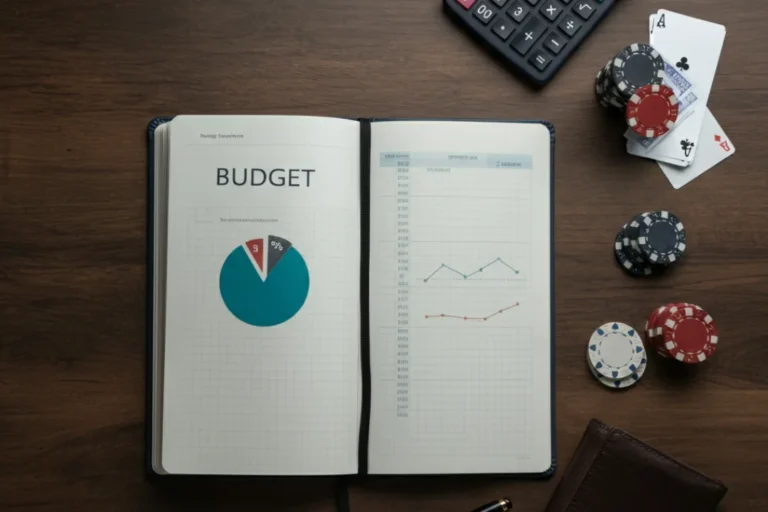If you enjoy gambling as a bit of fun or excitement, one of the most important things you can do is learn how to manage your gambling budget from the start. Without a clear money management plan, it’s all too easy to overspend and end up regretting your choices. Keeping control—rather than letting the games control you—helps gambling stay enjoyable without risking your financial wellbeing. In this guide, you’ll find realistic, straight-talking advice on how to set limits, watch your spending, and keep a healthy relationship with gambling.
Set a Realistic Overall Bankroll
Think of your gambling budget like movie ticket money—it should come only from your entertainment funds, never from your rent or grocery budget. Figure out exactly how much you can afford to spend and possibly lose on gambling, and treat this as a monthly bankroll. By separating gambling funds from living essentials, you draw a clear line to help avoid financial stress.
Determine Your Disposable Income
Start with your monthly income, subtract your bills, groceries, savings, and anything else that’s non-negotiable. What’s left is your disposable cash. If you’ve got $500 left over after covering everything else, you might choose $80 to $100 as your gambling budget for the month. Always pick a number you’d be okay with losing.
Separate Your Gambling Funds
Put your chosen gambling money in its own spot—a second bank account, a different wallet, or a prepaid card can work well. This simple habit helps you avoid dipping into the rest of your money and stick to your budget.
Establish Strict Session Limits
Breaking up your monthly gambling budget into smaller session limits is key to making your funds last. By setting clear maximums for each session, you avoid chasing losses or having a single bad night wipe out your whole budget. This approach is a staple of smart gambling money management.
The Percentage Rule
One simple method is to never put more than 10% of your monthly gambling bankroll into a single session. So, if your monthly limits are $300, keep any one session under $30. This way, even a run of bad luck won’t bust your budget all at once.
Time-Based Limits
Plan out your sessions ahead of time—not just how much you’ll spend, but for how long you’ll play. Setting a timer or alarm can be a big help. Leaving when your time’s up, win or lose, takes emotion out of the decision and reinforces discipline.
Define Your Staking Plan and Bet Sizing
Deciding how much to wager on each bet is crucial for keeping things fun and affordable. If you regularly change your bet size based on emotions, it’s easy to see your budget disappear quickly. A staking plan gives you structure and protects your bankroll from big swings.
To set up your staking:
- Flat Betting: Wager the same fixed amount every time. For instance, from a $60 session budget, you might make $2 bets throughout.
- Percentage Betting: Always bet, say, 2% of your current session balance. Win or lose, your bet sizes change with your bankroll—keeping risk steady.
Implement Stop-Loss and Take-Profit Rules
Knowing when to leave the table is just as important as knowing how much to bet. Before you begin, decide on your maximum loss (stop-loss) and your target win (take-profit) for each session and stick to them, no matter what’s happening in the game.
- Stop-Loss: Pick a loss limit (like $40 from a $100 session). If you hit this, walk away.
- Take-Profit: Set a goal for winnings—perhaps $140 from that same $100 start. If you hit it, stop and celebrate the win.
Track and Review Your Activity
Don’t rely on guesswork—keep a simple record of your play to see where you stand at a glance. Tracking your gambling sessions helps you spot patterns and make adjustments before small problems get big.
Use Simple Tracking Tools
You don’t need fancy software to stay on top of your gambling budget. A notebook, a spreadsheet, or a budget app works fine. For each gambling session, note the date, game, amount wagered, how much you left with, and even how you felt. Regular reviews—weekly or monthly—can help you stay accountable and make positive changes.
Conclusion: Discipline is Your Best Bet
At the end of the day, the real secret to managing a gambling budget is discipline—not good luck or clever tricks. Set aside only what you can lose, break it up into session limits, stick to your staking and stop-loss rules, and always know when to step away. By tracking your gambling activity and paying attention to your habits, you lay the groundwork for safe, fun, and responsible play. If you ever feel control slipping or anxiety rising, reach out for help—there are plenty of support resources and self-exclusion tools available. For guidance on responsible gambling and support options, you can visit BeGambleAware for confidential help.
Frequently Asked Questions
1. What is the best way to start a gambling budget?
Begin by looking at your leftover spending money after all regular expenses are paid. Decide on an affordable amount you’re genuinely comfortable losing and keep it separated from your daily funds.
2. How do I stop myself from chasing losses?
Setting a strict stop-loss before you start helps, and stick to it no matter what happens. Remind yourself that chasing losses rarely works and often leads to bigger financial setbacks.
3. Should I have a separate bank account for gambling?
Absolutely. Using a different account or payment app for gambling funds helps you stick to your limits and keeps the rest of your money safe for essentials.
4. How often should I review my gambling budget and results?
Make it a habit to check your records every week or month. Reviewing your sessions helps you catch risky behaviors early and fine-tune your strategy.
5. What if I find it hard to stick to my budget?
If you notice it’s a struggle to stay on track, that’s a sign to slow down and reach out for help. Explore self-exclusion programs or support groups—they’re there to keep gambling fun and safe.
You may also read: Smart Plays: 10 Essential Beginner Gambling Tips Online





